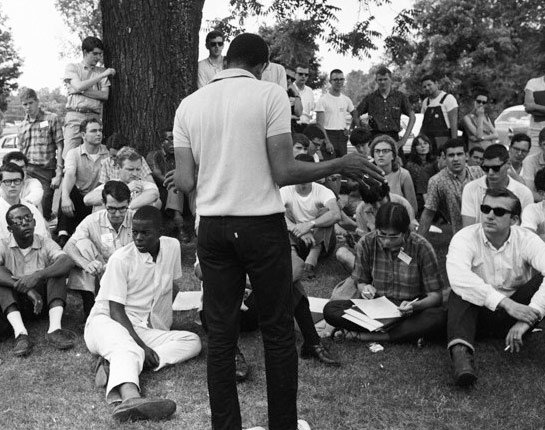


Now a religion professor at the University of Florida, Simmons says she overcame her anxieties of working in Mississippi by learning and singing spirituals, like "Oh, Freedom." "All my life, I had been taught about the horrors of Mississippi, so they thought that I must have been a bit crazy," Simmons says. Growing up in an African-American family in Memphis, Tenn., Simmons remembers her mother's fear of Mississippi. Simmons heard the three volunteers had gone missing during her second week of training, which she attended against her parents' wishes. "Then I really knew that none of us probably would get out of there alive. "I thought, 'Oh my God! You mean they will kill white men?' " Gwendolyn Zoharah Simmons, another Freedom Summer volunteer says. Kendall's roommate during orientation, Andrew Goodman, was killed that summer in Mississippi, along with James Chaney, an African-American Mississippi native, and Michael Schwerner, who, like Goodman, was from New York and Jewish. Two: Arrests - and not for one or two days, could go on into future. "We can expect three things this summer," he reads. Goodman and two other activists were later found buried in an earthen dam in Mississippi's rural Neshoba County. On June 29, 1964, the FBI began distributing this picture of civil rights worker Andrew Goodman of New York City, who disappeared near Philadelphia, Miss., a few days earlier. For too long, the rest of the country had ignored the bombing, brutalizing and killing of African-American residents who dared to protest for the right to vote. The answer was clear for the 800 or so mostly white student volunteers and their mostly black activist organizers headed for Mississippi. "Why would you interfere in what's going on in the South?"

"Many in the Oxford community wondered why," says Armstrong, who has created a historical walking tour about Oxford's role in Freedom Summer. "They needed something just a little further north, so that the ties to the South were not quite so strong," explains Ann Elizabeth Armstrong, theater professor at Miami University in Oxford. That's because Kentucky's Berea College bent to alumni pressure, and at the last minute backed out of hosting training sessions for volunteers preparing for Freedom Summer. Many of those activists started out in the small college town of Oxford, Ohio - by chance. It was part of a campaign now known as Freedom Summer, which brought activists around the country to the Deep South. In 1964, civil rights activist Bob Moses led the campaign to register black voters and educate black children in that state. Idealism drove hundreds of college students to Mississippi 50 years ago. Freedom Summer activists sing before leaving training sessions at Western College for Women in Oxford, Ohio, for Mississippi in June 1964.


 0 kommentar(er)
0 kommentar(er)
